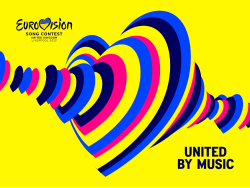
Back مسابقة الأغنية الأوروبية 2023 Arabic 2023 Avroviziya Mahnı Müsabiqəsi Azerbaijani Конкурс песні Еўрабачанне 2023 Byelorussian Конкурс песьні Эўрабачаньне-2023 BE-X-OLD Евровизия 2023 Bulgarian Eurosong 2023. BS Festival de la Cançó d'Eurovisió 2023 Catalan Eurovision Song Contest 2023 Czech Cystadleuaeth Cân Eurovision 2023 Welsh Eurovision Song Contest 2023 Danish
| Eurovision Song Contest 2023 | |
|---|---|
| United by Music | |
 | |
| Dates | |
| Semi-final 1 | 9 May 2023 |
| Semi-final 2 | 11 May 2023 |
| Final | 13 May 2023 |
| Host | |
| Venue | Liverpool Arena Liverpool, United Kingdom |
| Presenter(s) | |
| Executive producer | Andrew Cartmell |
| Director |
|
| Executive supervisor | Martin Österdahl |
| Host broadcaster | British Broadcasting Corporation (BBC) |
| Website | eurovision |
| Participants | |
| Number of entries | 37 |
| Number of finalists | 26 |
| Debuting countries | None |
| Returning countries | None |
| Non-returning countries | |
| |
| Vote | |
| Voting system | Each country awards one set in the semi-finals, or two sets in the final of 12, 10, 8–1 points to ten songs. In all three shows, online votes from viewers in non-participating countries are aggregated and awarded as one set of points. |
| Winning song | "Tattoo" |
The Eurovision Song Contest 2023 was the 67th edition of the Eurovision Song Contest. It took place in Liverpool, United Kingdom, as Ukraine, the winner of the 2022 contest with the song "Stefania" by Kalush Orchestra, was unable to host the event due to the Russian invasion of the country. The contest was organised by the European Broadcasting Union (EBU), with the British Broadcasting Corporation (BBC) acting as host broadcaster on behalf of the Public Broadcasting Company of Ukraine (UA:PBC). It was held at Liverpool Arena, and consisted of two semi-finals on 9 and 11 May and a final on 13 May 2023. The three live shows were presented by British singer Alesha Dixon, British actress Hannah Waddingham, and Ukrainian singer Julia Sanina, with Irish television presenter Graham Norton joining for the final.
Thirty-seven countries participated in the contest, three fewer than in 2022. Bulgaria, Montenegro, and North Macedonia opted not to participate, primarily due to the economic impact of the global energy crisis.[1][2]
The winner was Sweden with the song "Tattoo", performed by Loreen and written by her with Jimmy Thörnfeldt, Jimmy Jansson, Moa Carlebecker, Peter Boström, and Thomas G:son. Finland, Israel, Italy, and Norway completed the top five. Sweden won the combined vote and jury vote, and came second to Finland in the televote. Loreen became the second performer to win the contest twice, after Irish singer Johnny Logan; it was also the seventh win for Sweden, tying Ireland's record for the most Eurovision victories.
The EBU reported that the contest had a television audience of 162 million viewers in 38 European markets, an increase of a million viewers from the previous edition. A total of 15.6 million viewers watched the contest online on YouTube and TikTok.[3][4] The broadcast of the contest won the British Academy Television Award for Best Live Event, and Waddingham received a British Academy Television Award for Best Entertainment Performance nomination for her role as a co-presenter.
- ^ Rosney, Daniel (17 October 2022). "Eurovision: Montenegro and North Macedonia pull out of Liverpool contest". BBC News. Retrieved 20 October 2022.
- ^ Hallsenius, Hedda (8 November 2022). "Flera länder drar sig ur när Eurovision blir dyrare" [Several countries withdraw when Eurovision becomes more expensive]. SVT Nyheter (in Swedish). Sveriges Television. Retrieved 10 November 2022.
- ^ "Eurovision Song Contest 2023 reaches 162 million viewers with record breaking online engagement and musical impact". ebu.ch. European Broadcasting Union (EBU). 25 May 2023. Retrieved 25 May 2023.
- ^ "Welcome back Luxembourg! Here's what you've missed..." Eurovision.tv. EBU. 7 September 2023. Retrieved 8 September 2023.
